- Home
- Quizzes
- My Quiz Activity
- Newsletters
- Sports Betting
- MY FAVORITES
- Add Sports/Teams
- SPORTS
-
NFL
- NFL Home
- Arizona Cardinals
- Atlanta Falcons
- Baltimore Ravens
- Buffalo Bills
- Carolina Panthers
- Chicago Bears
- Cincinnati Bengals
- Cleveland Browns
- Dallas Cowboys
- Denver Broncos
- Detroit Lions
- Green Bay Packers
- Houston Texans
- Indianapolis Colts
- Jacksonville Jaguars
- Kansas City Chiefs
- Las Vegas Raiders
- Los Angeles Chargers
- Los Angeles Rams
- Miami Dolphins
- Minnesota Vikings
- New England Patriots
- New Orleans Saints
- New York Jets
- New York Giants
- Philadelphia Eagles
- Pittsburgh Steelers
- San Francisco 49ers
- Seattle Seahawks
- Tampa Bay Buccaneers
- Tennessee Titans
- Washington Commanders
-
MLB
- MLB Home
- Arizona Diamondbacks
- Atlanta Braves
- Baltimore Orioles
- Boston Red Sox
- Chicago White Sox
- Chicago Cubs
- Cincinnati Reds
- Cleveland Guardians
- Colorado Rockies
- Detroit Tigers
- Houston Astros
- Kansas City Royals
- Los Angeles Angels
- Los Angeles Dodgers
- Miami Marlins
- Milwaukee Brewers
- Minnesota Twins
- New York Yankees
- New York Mets
- Oakland Athletics
- Philadelphia Phillies
- Pittsburgh Pirates
- San Diego Padres
- San Francisco Giants
- Seattle Mariners
- St. Louis Cardinals
- Tampa Bay Rays
- Texas Rangers
- Toronto Blue Jays
- Washington Nationals
-
NBA
- NBA Home
- Atlanta Hawks
- Boston Celtics
- Brooklyn Nets
- Charlotte Hornets
- Chicago Bulls
- Cleveland Cavaliers
- Dallas Mavericks
- Denver Nuggets
- Detroit Pistons
- Golden State Warriors
- Houston Rockets
- Indiana Pacers
- Los Angeles Clippers
- Los Angeles Lakers
- Memphis Grizzlies
- Miami Heat
- Milwaukee Bucks
- Minnesota Timberwolves
- New Orleans Pelicans
- New York Knicks
- Oklahoma City Thunder
- Orlando Magic
- Philadelphia 76ers
- Phoenix Suns
- Portland Trail Blazers
- Sacramento Kings
- San Antonio Spurs
- Toronto Raptors
- Utah Jazz
- Washington Wizards
-
NHL
- NHL Home
- Anaheim Ducks
- Arizona Coyotes
- Boston Bruins
- Buffalo Sabres
- Calgary Flames
- Carolina Hurricanes
- Chicago Blackhawks
- Colorado Avalanche
- Columbus Blue Jackets
- Dallas Stars
- Detroit Red Wings
- Edmonton Oilers
- Florida Panthers
- Los Angeles Kings
- Minnesota Wild
- Montreal Canadiens
- Nashville Predators
- New Jersey Devils
- New York Islanders
- New York Rangers
- Ottawa Senators
- Philadelphia Flyers
- Pittsburgh Penguins
- San Jose Sharks
- Seattle Kraken
- St. Louis Blues
- Tampa Bay Lightning
- Toronto Maple Leafs
- Vancouver Canucks
- Vegas Golden Knights
- Washington Capitals
- Winnipeg Jets
- NCAAF
- NCAAM
- Boxing
- Entertainment
- Lifestyle
- Golf
- MMA
- Soccer
- Tennis
- Wrestling
- More Sports
- RESOURCES
- My Account
- YB on Facebook
- YB on Twitter
- YB on Flipboard
- Contact Us
- Privacy Policy
- Terms of Service
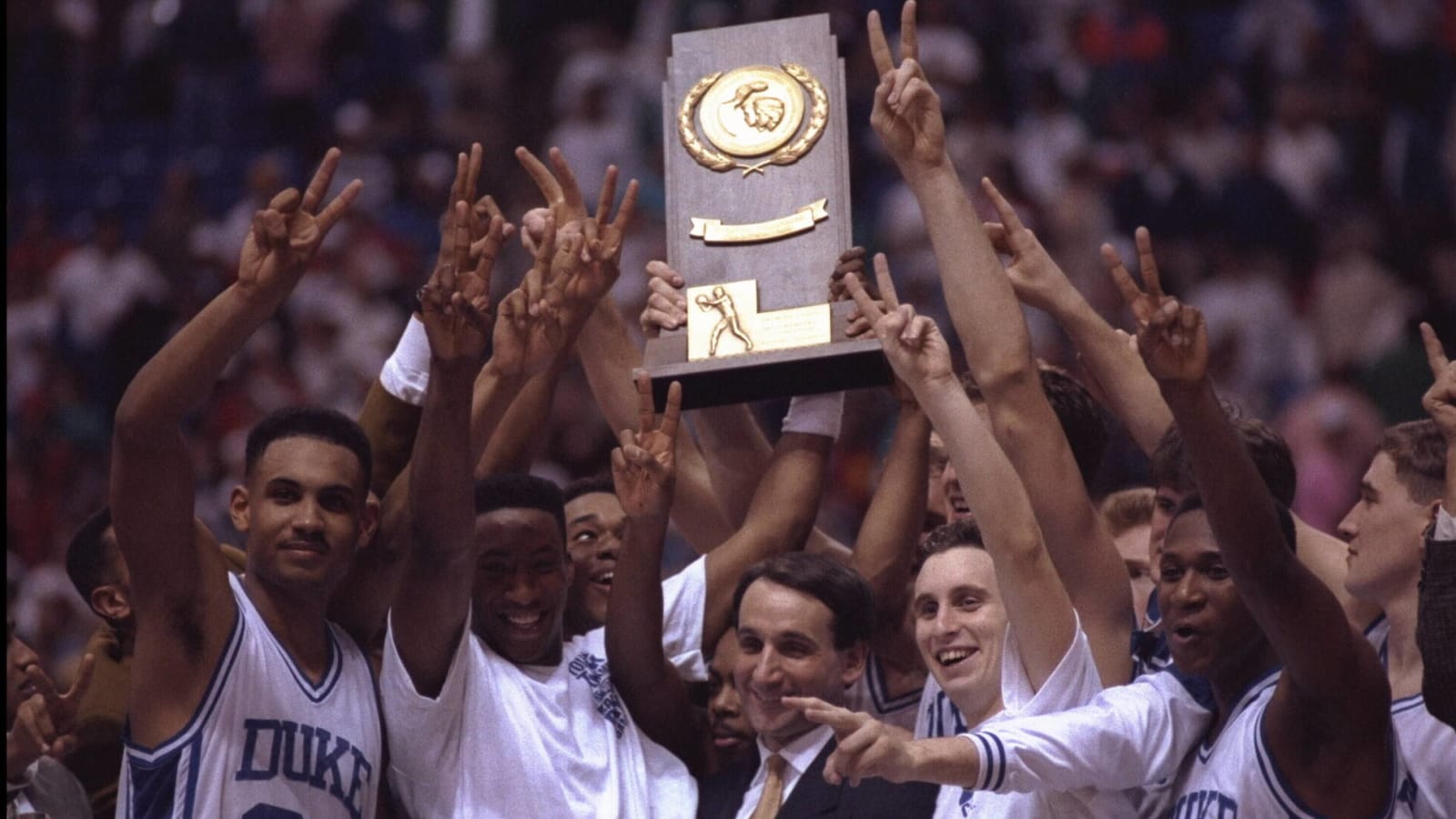
Ranking the NCAA men's tournament champions since 1990
Ranking champions is always difficult just due to the nature of change. Pretty much no champion deals with the same obstacles or advantages as anyone else, but a rankings system has to consider both the landscape of the sport during that championship season as well as try to keep a throughline that links criteria together.
That is certainly true with NCAA Tournament champions. When making a list of the best tournament champions since 1990, you are considering champions during the senior-heavy seasons, the era when the best high school prospects didn't even go to college and the one-and-done era. Now you will be factoring schools that currently live in the NIL format and a free agent approach to transfers with the portal. That doesn't even take into account how the tournament is now held, with the pod system and true seeding. Oh, and there was a canceled tournament and one held in a bubble of sorts with limited fans.
That's what actually makes ranking these champions so much fun — you get to go back in time and consider what their world was about when they accomplished one of the great achievements of their lives. Their one shining moment.
So here are the champions since 1990, ranked.
#33 - UConn Huskies, 2014

Anyone on this list deserves their championship, but this is a list of where the champions rank against each other. So let's be real — the 2014 UConn Huskies were a second place team in the American Athletic Conference (and actually the No. 4 seed in the AAC tournament) that lost their final regular season game by 33 points. They were the No. 7 seed in the NCAA tournament and needed overtime to get out of the first round. After that, Shabazz Napier (who was on the 2011 title team) just carried his team on his back and fought off this list of schools: Villanova, Michigan State, Florida and Kentucky to win UConn's fourth national championship.
#32 - UConn Huskies, 2011
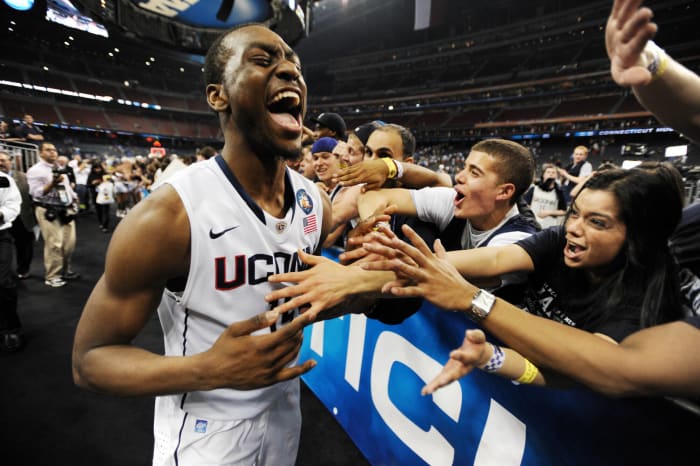
I swear I am not picking on the Huskies! This version of UConn really struggled to close out the regular season, going 4-7 to end Big East play. That's when Kemba Walker and the Huskies turned it on. UConn would win five games in five days to capture the Big East tournament crown — beating Pitt, Syracuse and Louisville in back-and-forth games — before making their NCAA tournament run. They would beat a pair of Wildcats (Arizona and Kentucky) in close games before winning possibly the ugliest NCAA championship game ever over Butler. Kemba Walker was the nation's second-leading scorer and got help from Jeremy Lamb, Alex Oriakhi and Shabazz Napier on their way to the only Final Four with no No. 1 or No. 2 seeds.
#31 - Florida Gators, 2006
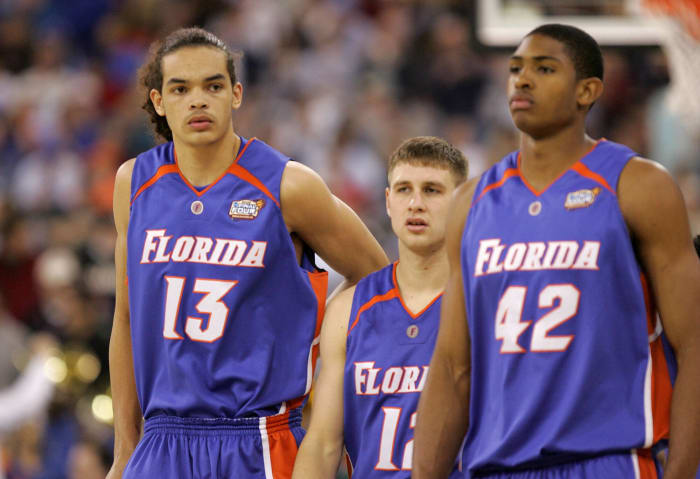
You'll see basically the same Florida Gators team much further down this list in a bit, but the 2006 version wasn't quite the juggernaut yet. The unranked Gators shot out to a 17-0 record and the nation's No. 2 ranking before hitting a rough patch of six losses in 11 games mid-season. Florida hit their stride again in the SEC tournament and used their suffocating defense (led by Joakim Noah) to stuff any challengers in the NCAA tournament. Again, we will see Noah, Corey Brewer, Al Horford, Taurean Green and Lee Humphrey again on this list.
#30 - Michigan State Spartans, 2000
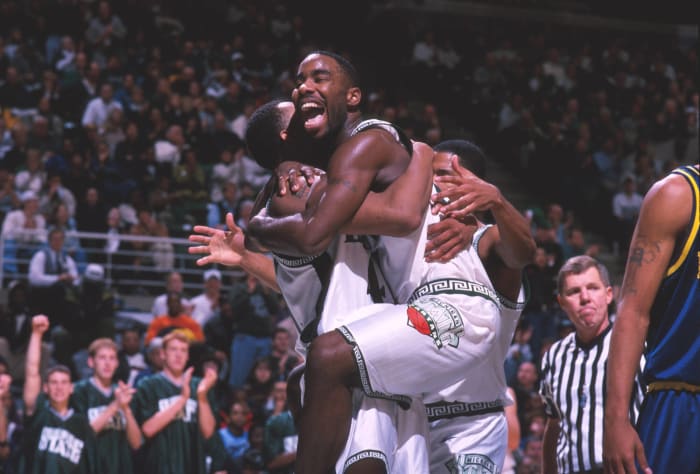
Tom Izzo's "Flintstones" is still his only national championship team and as of now the last Big Ten team to win the NCAA tournament. Izzo's team was filled with upperclassmen, with Mateen Cleaves the unquestioned leader. Mo Peterson, Charlie Bell, Andre Hutson and A.J. Granger (with freshman Jason Richardson) embodied what we know Michigan State basketball to be — hard nosed, tough and physical.
#29 - Duke Blue Devils, 2010
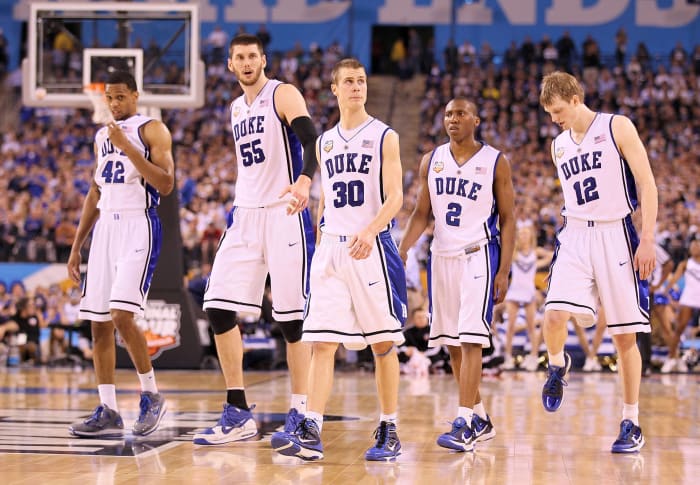
Mike Krzyzewski's career is so successful that people sometimes forget about the 2009-2010 national championship team. It wasn't the star-studded roster you typically think of when you remember championship Blue Devils, but this was a unit that worked so well together and took full advantage of their opportunities. Kyle Singler, Nolan Smith, Lance Thomas and current Duke head coach Jon Scheyer (and the start of the run of Plumlees) led Coach K's bunch slowly but surely up the rankings and into the championship game against Cinderella Butler. Of course, what if Gordon Hayward's shot went in?
#28 - Louisville Cardinals, 2013
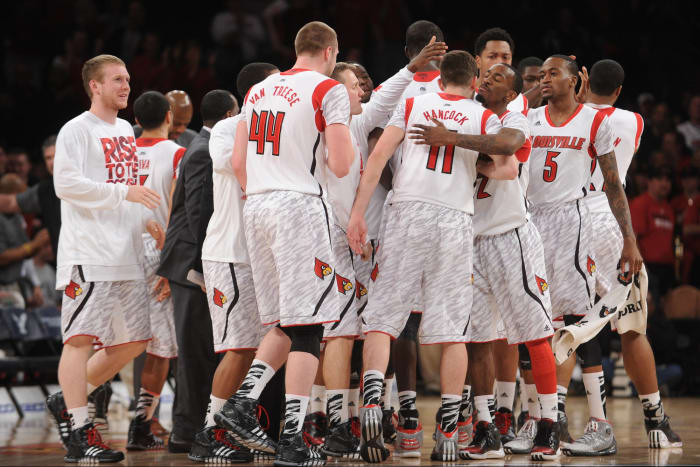
Yes, on this list, the 2013 Louisville Cardinals championship still counts. Louisville began the season 16-1 before suffering a three game losing streak mid-season ... then entered the tournament on a 10-game winning streak and the top overall seed. Louisville blew through the Midwest Region (though lost Kevin Ware to a gruesome leg injury during their win over Duke) before dispatching Cinderella Wichita State in the Final Four and Michigan in a hard fought title game. The backcourt of Peyton Siva and Russ Smith were nearly unstoppable during the tournament while Gorgui Dieng defended the paint. Luke Hancock is still the only bench player to win the Final Four's Most Outstanding Player award.
#27 - Arizona Wildcats, 1997
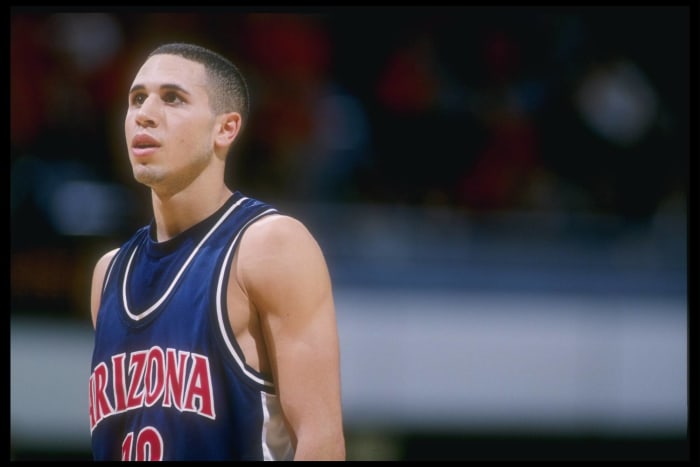
Arizona's lone national championship team kind of came out of nowhere to create history. Arizona was just 11-7 in the Pac-10 and had lost four of their last eight regular season games before entering the NCAA Tournament as a No. 4 seed. After barely getting past South Alabama and College of Charleston, Lute Olson's squad would go on an epic two-week stretch of basketball. They would beat Kansas, North Carolina and Kentucky (with Providence stuck in there) to win the national championship. Three of the bluest of bloods and all three No. 1 seeds, making Arizona the only team to defeat three No. 1 seeds in a single tournament. Interestingly, this wasn't considered a great team at the time, though the roster would say otherwise: Miles Simon, Jason Terry, Mike Bibby and Michael Dickerson.
#26 - Kentucky Wildcats, 1998
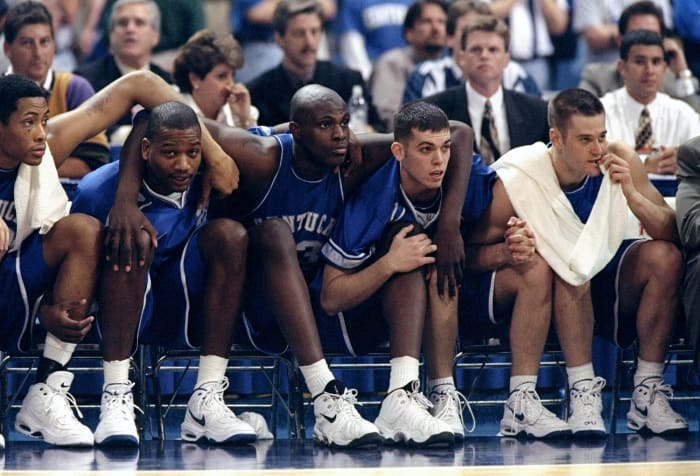
When you think of Kentucky's championship teams, you think of squads dripping with NBA talent. The 1997-1998 team wasn't really that kind of team. Sure, Nazr Mohammed played about 40 years in the NBA (okay, actually 18) and his backup Jamaal Magloire had a nice pro career, but this was a solid college team that was greater than the sum of its parts. Their top six guys were all upperclassmen. Wayne Turner, Jeff Sheppard and Scott Padgett got some measure of revenge against Duke in the regional final before knocking of Stanford and Utah in the Final Four and title games. Kentucky's seventh national championship completed an impressive run of three straight title games and two championships and gave Tubby Smith his only championship.
#25 - North Carolina Tar Heels, 2017
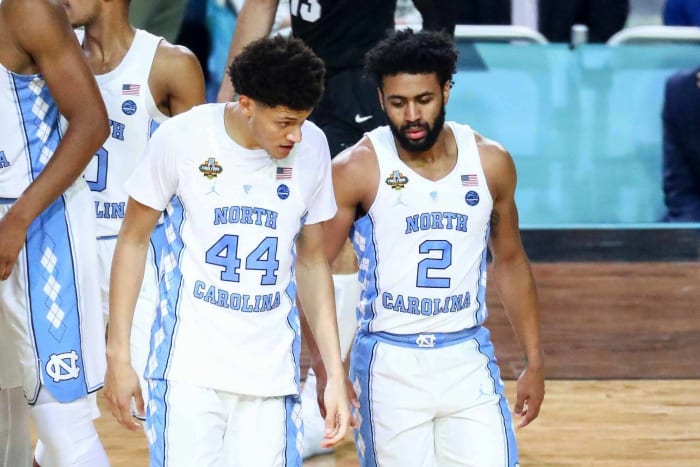
Roy Williams' final national championship team was simply nicknamed "Redemption". After losing the 2016 national championship game on a buzzer beater, the Heels clawed back to the title game by needing their only last-second shot to beat Kentucky in the regional final and key offensive rebounds to get past Oregon in the Final Four before beating a one-loss Gonzaga team in a clunky and physical championship game. Not the most NBA-talented Roy Williams or North Carolina squad, but one that was driven with a purpose and wouldn't be stopped until they found ... redemption.
#24 - Syracuse Orange, 2003
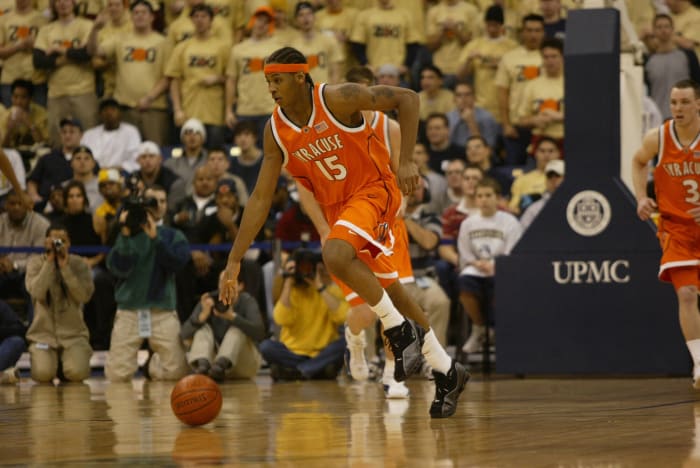
A rather legendary squad for a few reasons. For one, it showed how a freshman player (in a day where elite high school talents went straight to the NBA) could pull a team to a national championship. Carmelo Anthony brought Jim Boeheim and Syracuse their lone national title with a revered run through the Big Dance and a huge block by Hakim Warrick on Michael Lee to lock down the title win. Melo averaged 22 points and 10 rebounds for the season.
#23 - Kansas Jayhawks, 2022
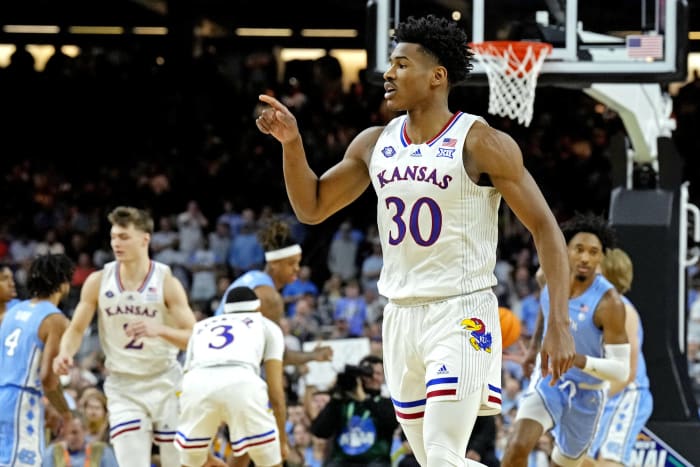
When you look at this list, you'll notice that there is no champion for the 2020 season as the tournament was canceled due to the global pandemic. Kansas was the top team in the nation when the world stopped. While the 2022 Jayhawks weren't the exact same team, guys like Christian Braun, David McCormack and Ochai Agbaji were there and made the largest comeback in national championship history against North Carolina. McCormack called it "avengement", but any way you put it, this title vaulted Bill Self into the conversation among the great coaches.
#22 - UConn Huskies, 2004
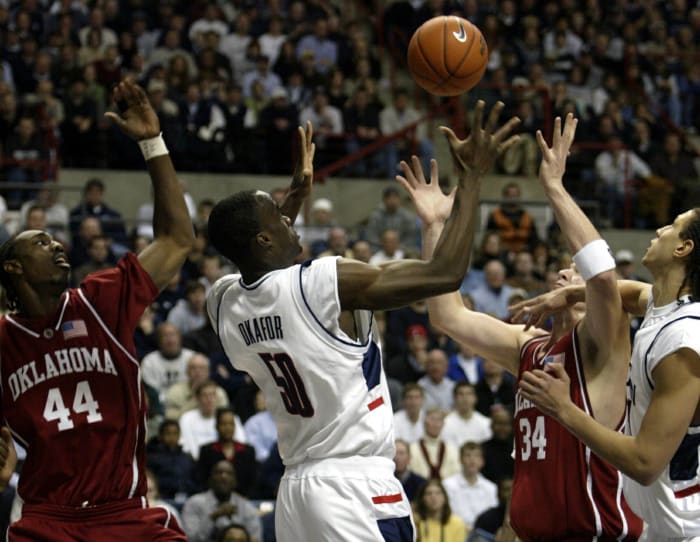
All four of UConn's title teams can be defined by their dominant guard, and the 2004 version was Ben Gordon. Gordon led the Huskies in scoring, but center Emeka Okafor was so dominant. The junior averaged 17.6 points and 11.5 rebounds and was a two-time national defensive player of the year. UConn cruised to the Final Four but needed a big comeback to down Duke (led by Luol Deng, Chris Duhon, J.J. Redick and Sheldn Williams) before pushing aside Georgia Tech in the title game. Six future NBA players were on this roster.
#21 - UCLA Bruins, 1995
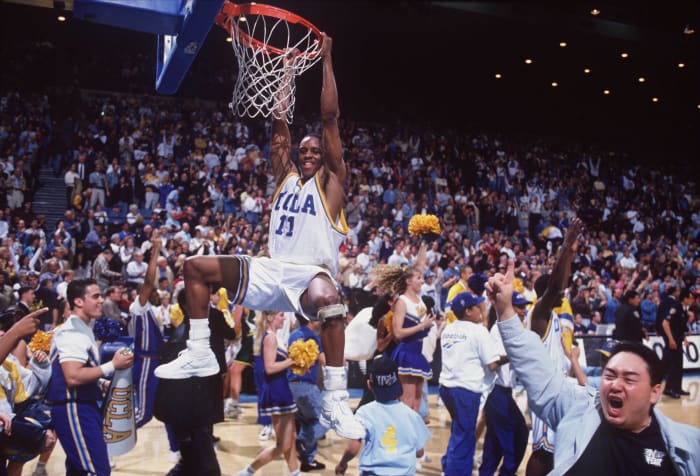
This is UCLA's lone national championship outside the John Wooden era and was the Bruins' first Final Four since 1980. UCLA won their final 19 games of the season to bring home their record 11th national title. National Player of the Year Ed O'Bannon led a talented bunch that included his brother Charles O'Bannon, Tyus Edney, George Zidek, Cameron Dollar and freshmen Toby Bailey and J.R. Henderson. Edney's layup to beat Missouri in the second round kept UCLA's title hopes alive, then beat defending champion Arkansas in the championship game.
#20 - Villanova Wildcats, 2016
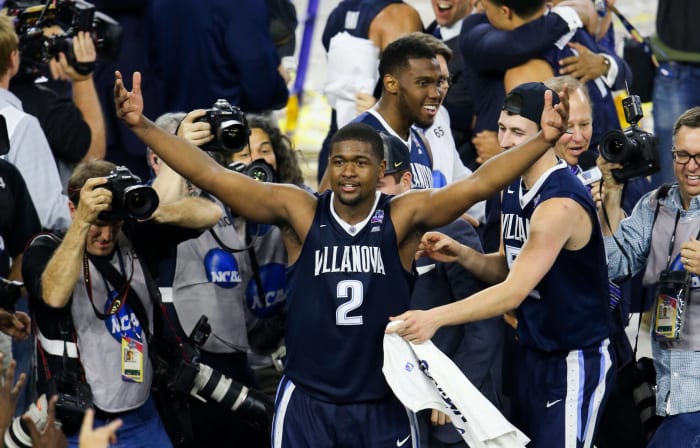
The '16 Wildcats will forever be remembered by Kris Jenkins' buzzer-beater and confetti instantly falling from the ceiling, but that just scratches the surface of Villanova's rebirth as a national power. And look at that roster: Jenkins, Josh Hart, Ryan Arcidiacono, Daniel Ochefu, Donte DiVincenzo, Phil Booth, and future National Player of the Year Jalen Brunson. A huge moment for a program that was best known for their championship upset in 1985 and a then-recent string of disappointing postseason efforts.
#19 - Duke Blue Devils, 2015

This was Mike Krzyzewski's final national championship team and his only one dominated by freshmen. Coach K embraced the one-and-done culture late in his career, and the freshmen trio of Jahlil Okafor, Justise Winslow and Tyus Jones (plus a big effort from fellow frosh Grayson Allen) took it to a Wisconsin team that took down undefeated Kentucky in the national semifinal. The key to the success of this team was senior point guard Quinn Cook, who followed in the footsteps of experienced and cool-headed lead guards that Krzyzewski depended on with all five of his title squads.
#18 - UNLV Rebels, 1990
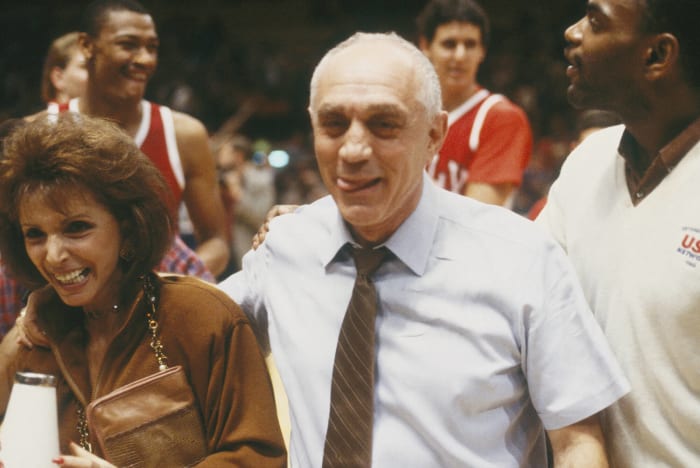
This was a great team, but not as great as the following season. The 1990-1991 Rebels were legendary, but the 1989-1990 team was the one that won the national championship. The team of Larry Johnson, Stacy Augmon, Greg Anthony and Anderson Hunt are most remembered for blowing out Duke by 30 in the national championship game and blowing out high scoring Loyola-Marymount by 30 in the Elite 8, but they had some puzzling losses as well. They lost two Big West games and were nearly taken out by Ball State in the Elite 8. The shining moment of Jerry Tarkanian's career.
#17 - North Carolina Tar Heels, 1993
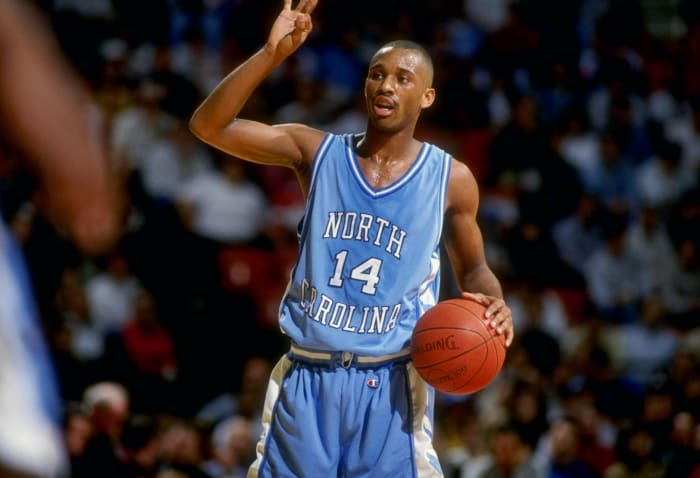
While most people remember Chris Webber's timeout putting the nail in the coffin in another Fab Five championship loss, many tend to forget that North Carolina had their own elite recruiting class the year prior to Michigan's legendary class. That class — led by Eric Montross, Derrick Phelps, Brian Reese, Pat Sullivan and Kevin Salvadori — became the core of Dean Smith's second national championship team. Senior George Lynch ruled the paint while sweet shooting sophomore (and Final Four MOP) Donald Williams bombed away from deep.
#16 - Kansas Jayhawks, 2008
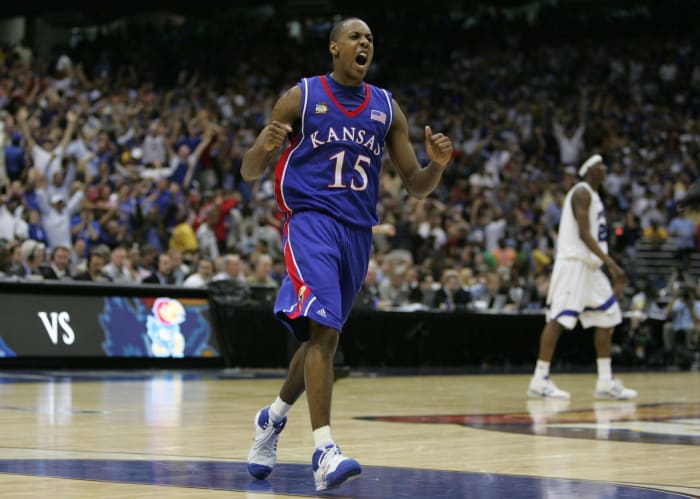
The Jayhawks won the greatest Final Four ever assembled, seed-wise. All No. 1 seeds made it to San Antonio, with Kansas blowing out North Carolina in the semifinals before outlasting Memphis in overtime (Memphis' missed free throws and Mario Chalmers' shot will live forever in NCAA tournament history). The Jayhawks were led by Chalmers, Darrell Arthur, Brandon Rush, Sherron Collins and bigs Sasha Kaun, Cole Aldrich and Darnell Jackson. Kansas got to the Final Four by holding on against Steph Curry's Davidson.
#15 - Maryland Terrapins, 2002
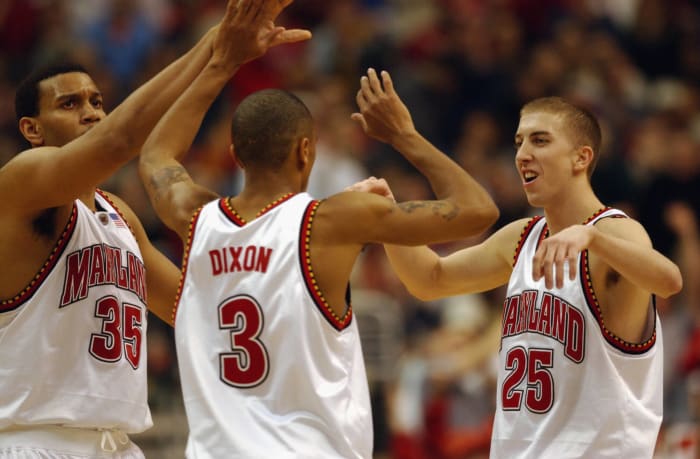
The 2001-2002 Maryland Terrapins were the culmination of what Gary Williams built at College Park. After reaching the Final Four in 2001 and losing to Duke (those Duke-Maryland games in the early 2000s were epic), the Terps dominated a tough ACC with a 15-1 record and took hold of their destiny with their title win over Indiana. Steve Blake, Juan Dixon, Chris Wilcox, Lonny Baxter and Byron Mouton will always be legends in the DMV area.
#14 - Virginia Cavaliers, 2019
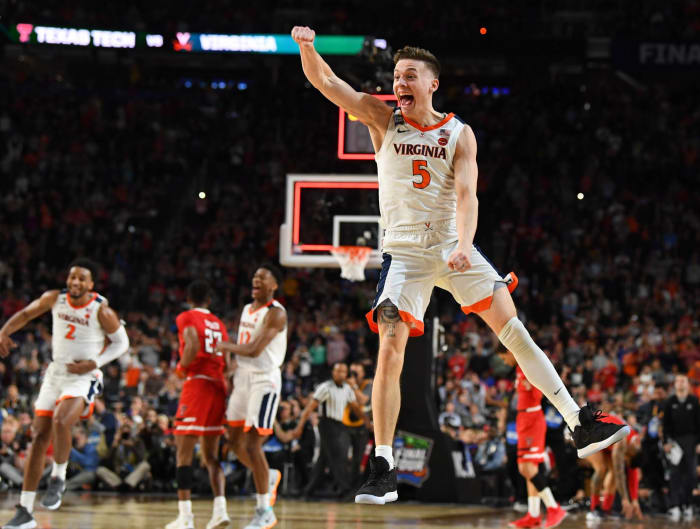
Talk about a redemption! Virginia was the laughingstock of the sports world after becoming the first No. 1 seed to lose to a 16-seed in tournament history in 2018 (and they were beaten bad by UMBC, 74-54). But the Cavs picked themselves up and made one of the most grueling runs ever by adding solid offense to their tough pack-line defense. Kyle Guy, De'Andre Hunter, Ty Jerome, Mamadi Diakite, Braxton Key and freshman Kihei Clark hit big shot after big shot during March. They held on to beat Oregon, had one of the greatest game-tying plays to beat Purdue, and slowed down Auburn's speedy guards in a squeaker of a win before beating Texas Tech in overtime for the national championship.
#13 - Arkansas Razorbacks, 1994
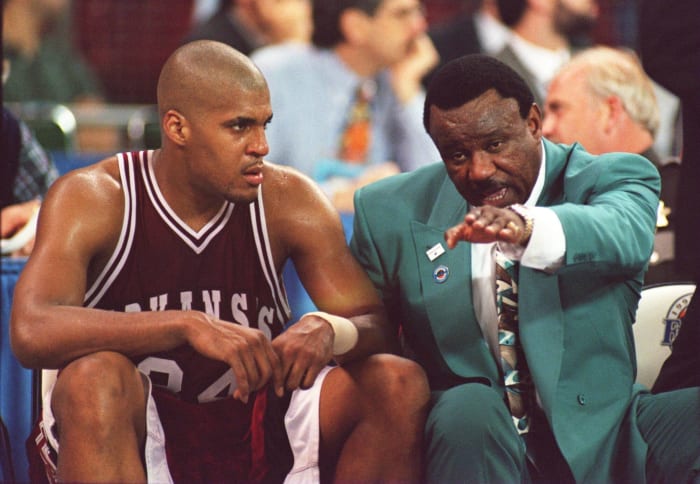
Nolan Richardson's "40 Minutes of Hell" was perfectly exemplified by the Razorbacks' 1994 championship team. Corliss "Big Nasty" Williamson bullied his way around the paint while Scotty Thurman had a whale of a Final Four in Charlotte to bring home Arkansas' first and only title. The Razorbacks lost two regular season games by a total of three points before losing to Kentucky in the SEC tournament semifinals. The Hogs then barreled through the NCAA tournament before Thurman's huge three-pointer topped Duke in the national championship game.
#12 - Duke Blue Devils, 1991
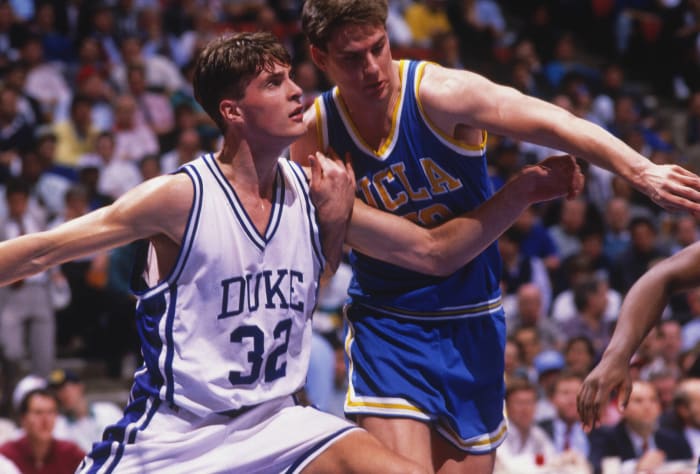
A younger, less powerful version of the 1992 team, the 1991 Duke Blue Devils won the ACC regular season championship and stomped their way back to the Final Four. There they would get a rematch of the previous season's national championship game against undefeated UNLV. The Blue Devils played with poise and beat the Rebels, then knocked off Roy Williams' Kansas Jayhawks for the program's first national championship.
#11 - UConn Huskies, 2024
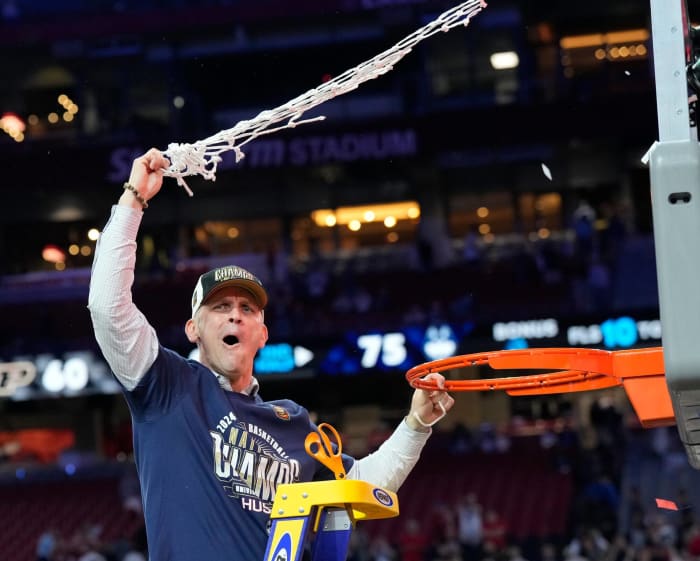
This Huskies team blew through the NCAA tournament, setting a record for point differential in a single tournament. The 2024 team became just the third repeat champion on this list but the first to not return a bulk of their starters. Connecticut was relentless in 2023-2024, aggressively attacking defenses with their precise offensive movement while putting pressure on opponents with their defense. Danny Hurley's mixture of holdovers from their previous title team (led by Tristan Newton), guys stepping up into new roles (Donovan Clingan), freshman (Stephon Castle) and a transfer who fit perfectly (Cam Spencer) seems to be the modern way of winning championships. They are a superb champion for the reasons the greats one are: the only team that can beat them is themselves and you have to take advantage of every opportunity when they do have an off night.
#10 - North Carolina Tar Heels, 2005
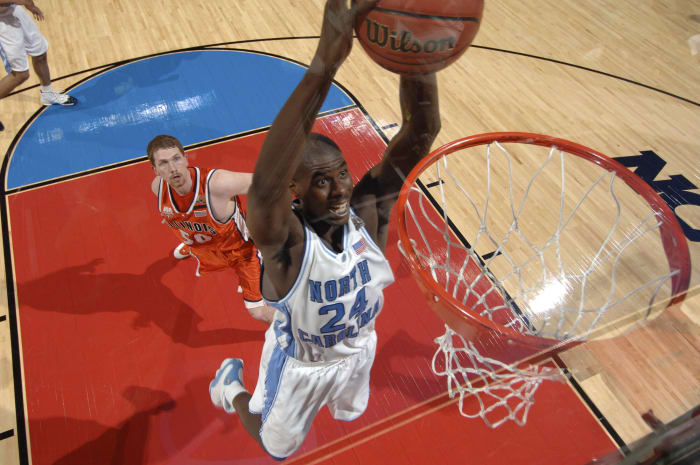
Roy Williams was brought back to his alma mater to restore North Carolina to glory and it took him just two seasons to do it. Led by juniors Raymond Felton, Sean May and Rashad McCants, the 2004-2005 Tar Heels cruised through the season after losing their opener against Santa Clara, going 33-4, and beating No. 1 Illinois in the final. Just three years removed from an 8-20 season, Ol' Roy wins his first national championship and returned Carolina to glory.
#9 - Florida Gators, 2007
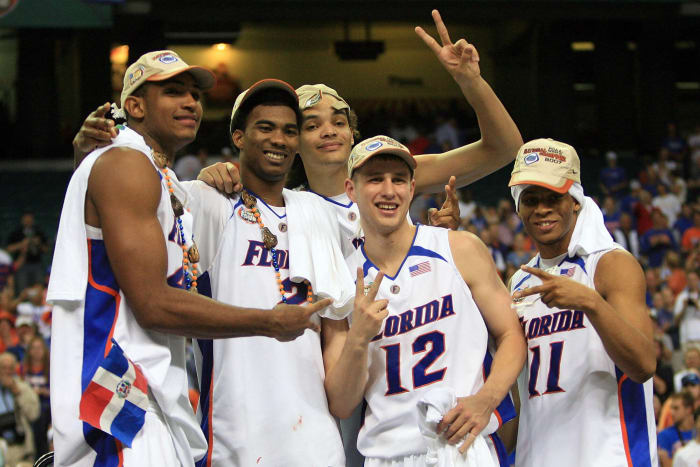
This is the last team to repeat as national champions. A year after shocking everyone to win their first title, the Gators ran it back and became the first school since 1991-1992 Duke to win back-to-back titles. Joakim Noah, Corey Brewer, Al Horford, Taurean Green and Lee Humphrey made up one of the most gelled starting units on this list and ran out to a 24-2 record before losing three straight road games at the end of the regular season, Florida got back on track and pushed through the SEC and NCAA tournaments, winning both titles ... including beating a very strong Ohio State Buckeyes team in the title game. Interestingly, Florida also beat Ohio State for the football national championship that year.
#8 - Villanova Wildcats, 2018
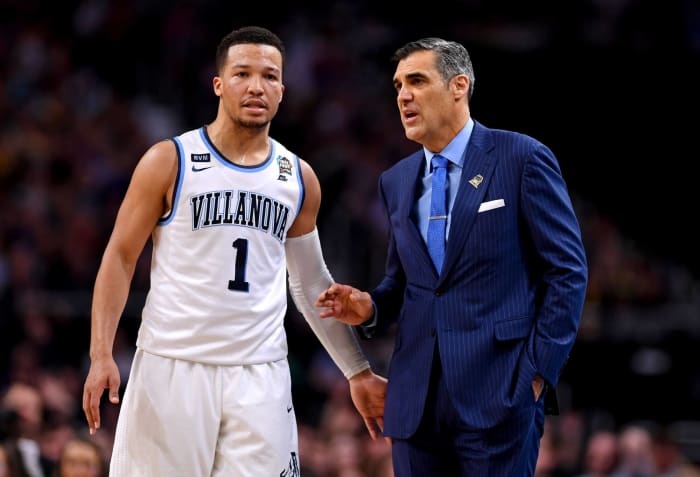
This Villanova team was one of the greatest offensive champions in history. National Player of the Year Jalen Brunson led a lineup with Mikal Bridges, Donte DiVincenzo, Omari Spellman, Phil Booth and Eric Paschall were so efficient and could beat you in a variety of ways, including peppering threes from anywhere. The Wildcats would begin the season 22-1 before hitting some turbulence late in the season (they lost three games in a six-game stretch in February). Nova blew through the tournament, blowing out Kansas and Michigan in the Final Four to bring home their third championship and second in three years.
#7 - Baylor Bears, 2021
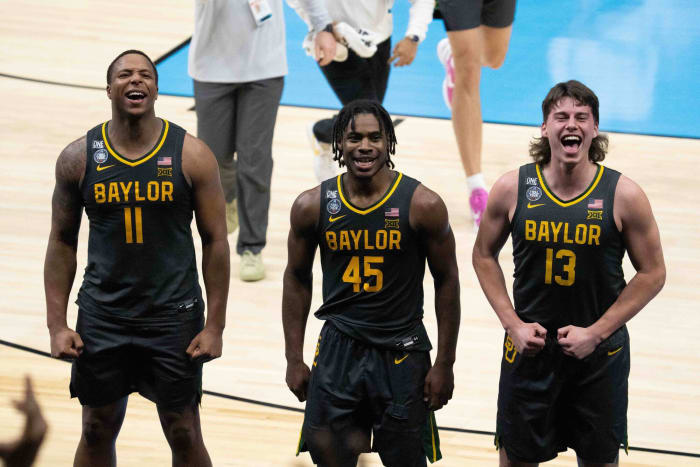
These Bears were underappreciated all season long as Gonzaga's undefeated season took most of the headlines, but the Bears were right there with the Zags. No champion on this list went through as much during their season. Remember that this was the COVID season, where games were played in empty arenas and schedules were subject to change at any moment. Baylor had 10 games cancelled or postponed due to COVID issues, including the Bears program essentially shutting down for two weeks in February. Baylor's first loss of the season was to Kansas, which was their first game after the COVID shutdown. Once the tournament began, Baylor's physical play carried them through the dance as they dominated undefeated Gonzaga in the title game. The trio of MaCio Teague, Davion Mitchell and Jared Butler were suffocating that season.
#6 - North Carolina Tar Heels, 2009
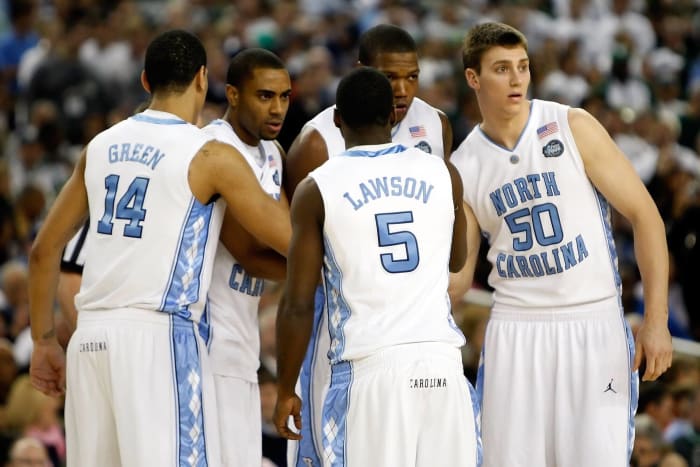
While the 2017 Tar Heels championship is known as "Redemption", the 2009 Heels were all about domination. North Carolina was blown out of the gym by Kansas in the 2008 Final Four and everybody came back to finish the job and win the championship — and they did. Tyler Hansbrough, Ty Lawson, Wayne Ellington and Danny Green ran through the regular season and then smoked the tournament, winning every game by at least 12 points. They destroyed Michigan State in the championship game in Detroit, crowning Roy Williams' best Tar Heels team as champions.
#5 - UConn Huskies, 1999
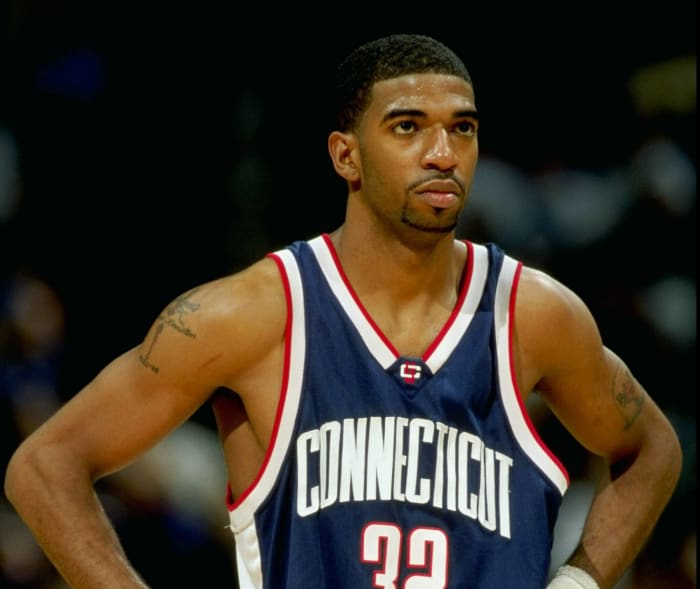
It is rare that we watch two teams sizing each other up all year and then meet in the national championship game, but just like Baylor and Gonzaga did in 2021, UConn and Duke did so in 1999. UConn went 34-2 that season, with Richard Hamilton leading the way (21.5 ppg), alongside Khalid El-Amin, Ricky Moore, Kevin Freeman and Jake Voskuhl. The Huskies beat 12 ranked teams during the season and despite losing just two games, winning the Big East regular season and conference tournament, were shipped out to the West Region where they had to play in Denver and Phoenix. Jim Calhoun ran with the lack of respect angle and rumbled to the program's first Final Four where they'd showdown with Duke in the finale. That game was everything you'd want it to be, as Hamilton outscored Duke's Trajan Langdon, 27-25, and the Huskies win their first title, 77-74.
#4 - Kentucky Wildcats, 2012
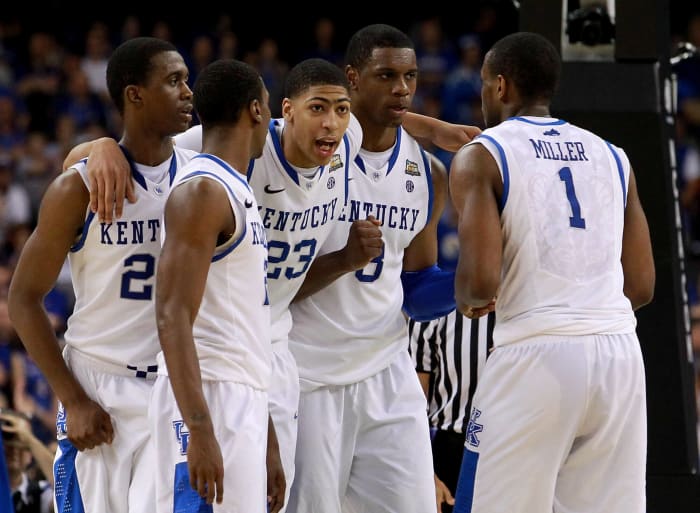
This version of the Wildcats were led by Anthony Davis, who had one of the best one-and-done seasons in history. Kentucky lost twice all season — a buzzer beater at Indiana and a curious loss to Vanderbilt in the SEC championship game. Davis was dominant as a defensive force, basically locking up the paint and vacuuming every rebound. That allowed Doron Lamb, Michael Kidd-Gilchrist, Terrence Jones, Marquis Teague and Darius Miller the freedom to take chances on defense and have confidence in their shots on offense. This wasn't as dominant a Kentucky team as some of their previous champions, but one of the best defensively.
#3 - Duke Blue Devils, 2001
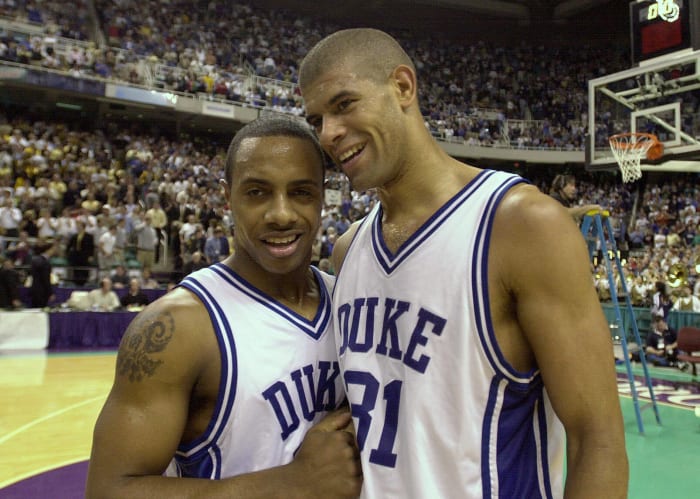
This Blue Devils team was ridiculously talented. Jay Williams, Mike Dunleavy Jr., Shane Battier, Carlos Boozer and Nate James led the Blue Devils to their third-ever national championship and finished a four-year run where Duke went 133-15. This is how great they were: Williams won the NABC Player of the Year award while Battier won the Naismith and Wooden Awards. Yes, two player of the year winners on the same squad. Three of their four losses that season were by two points or less and their comeback against Maryland at the height of their rivalry is still one of the greatest moments in program history.
#2 - Kentucky Wildcats, 1996
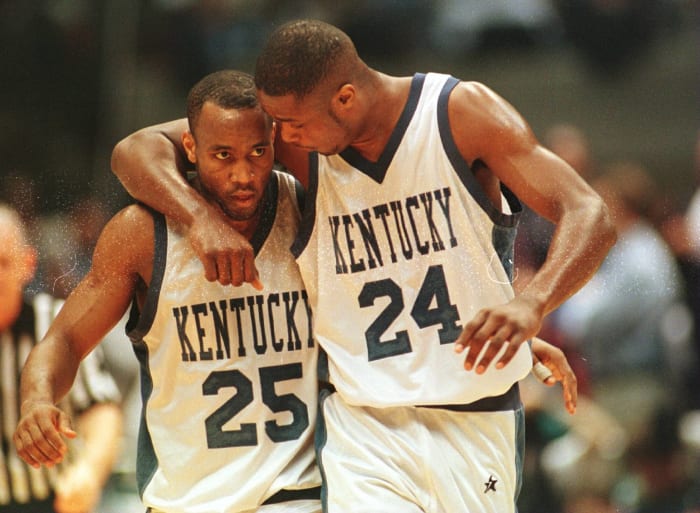
Rick Pitino's Wildcats went 34-2 this season, with the lone losses coming to John Calipari's UMass squad (who Kentucky would go on to beat in the Final Four) and Mississippi State (who would also reach the Final Four) in the SEC championship game. Tony Delk, Antoine Walker and Walter McCarty led the Cats with Ron Mercer, Derek Anderson and Mark Pope as major contributors. Kentucky blew through the Midwest Region (including dominating Tim Duncan's Wake Forest) and held off UMass and Syracuse for the national title.
#1 - Duke Blue Devils, 1992
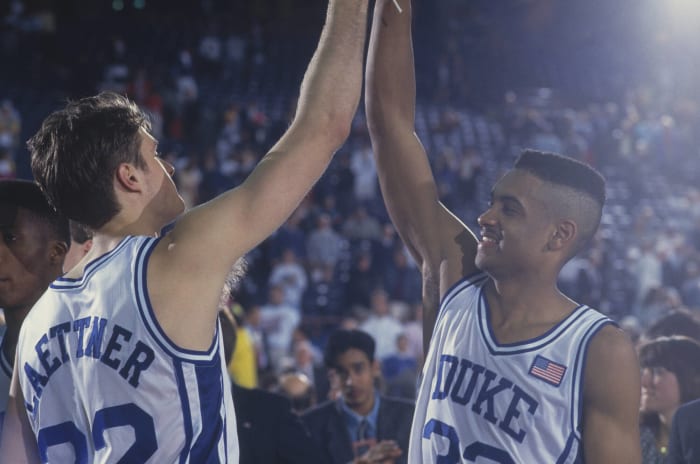
The top team is one of the oldest teams on this list. The Duke Blue Devils returned most of their 1991 championship team. Christian Laettner, Grant Hill and Bobby Hurley anchored one of the most cohesive units over the last 30 years and gained Mike Krzyzewski his second national title. The Blue Devils capped it off by beating the Fab Five Michigan Wolverines in the national championship game, 71-51. Of course, the iconic moment of this team was Laettner's shot to beat Kentucky in the East Region final.
More must-reads:
- Clippers make key decision regarding Kawhi Leonard's status
- Report: Kevin Durant 'never felt comfortable' in Suns' offense
- The '100 catches in an NFL season' quiz
Breaking News
Customize Your Newsletter
 +
+
Get the latest news and rumors, customized to your favorite sports and teams. Emailed daily. Always free!
Use of this website (including any and all parts and
components) constitutes your acceptance of these
Terms of Service and Privacy Policy.

